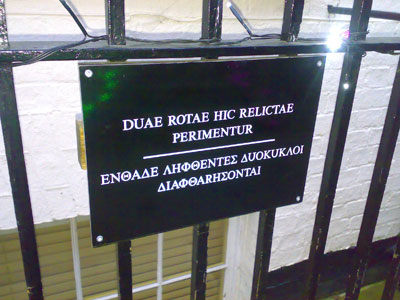Make your message crystal-clear every time
You understand it – but do they?
When I was walking in the centre of Cambridge recently, I saw this sign. My Greek isn’t up to much, but if I dredge the silty waters of my schooldays, I can just about get my head around the Latin. And when I worked it out, I chuckled to myself.
Put yourself in their shoes
It’s very easy to forget the reader. I’ve written about humour before, and how it’s best in small doses. Remember too that what seems funny to you may just baffle your reader at best, or make them feel stupid at worst. But it’s not just humour. Often, it’s jargon. When I worked in the high-tech sector, it was a constant struggle to keep industry buzzwords to a minimum – or at least to explain them clearly. Recently, I helped a non-technical friend of mine set up her broadband connection, and realised that to the average person, technical terms (ADSL, ISP, megabit, megabyte, upload/download) can be very confusing.Tanks a lot
I felt confused myself the other day when I saw a BAE Systems advert in The Spectator (a UK current-affairs magazine). When it comes to delivering FRES, no one has a better track record, read the title. Ah, I thought. Very clever. They want me to read the body copy so I can find out what FRES means. So I did. But there was no explanation. Let me save you the trouble of Googling it. FRES stands for Future Rapid Effect System, which aims to provide the British Army with a ‘family of medium-weight, network-enabled, air-deployable armoured vehicles’. Somehow, I think the average reader of The Spectator wouldn’t know that. But they could always look it up on the Ministry of Defence website, where they’d find out all about ‘central pillars’ and ‘key drivers’ (neither of which are actually inside the vehicles). See what I mean about jargon?And finally
Talk of vehicles brings us rather neatly to where we started – that sign. It tells cyclists that if they attach their bike to the railings, it’ll be removed. A simple message, wittily delivered in two languages that nobody is likely to understand. Like I said – very clever, and very silly. (PS: Yes, you’re right – Romans didn’t have bicycles. ‘Duae rotae’ means ‘two wheels’. Well spotted.)Categories
- Advertising (9)
- Art (1)
- Blogging (5)
- Blogs (3)
- Books (3)
- Branding (12)
- Communication (92)
- Content (1)
- Content marketing (1)
- Copycam (12)
- Copywriting (120)
- Creativity (8)
- Customer service (18)
- Design (2)
- Education (2)
- Grammar (10)
- Ideas (144)
- Internet (5)
- Language (24)
- Marketing (234)
- Music (1)
- Newsletters (2)
- Philosophy (3)
- Politics (8)
- Pricing (8)
- Productivity (15)
- Psychology (9)
- Punctuation (4)
- Sales (2)
- Sales letters (2)
- SEO (2)
- Service (7)
- Social media (5)
- Social networking (1)
- Technology (13)
- TED (30)
- Typography (1)
- Web design (2)
- Writing (40)